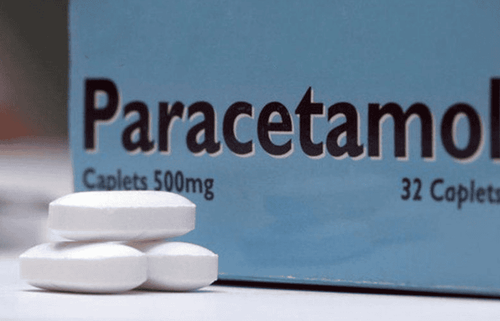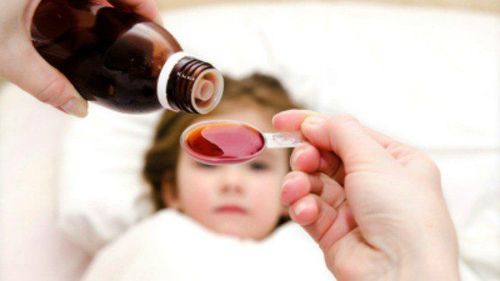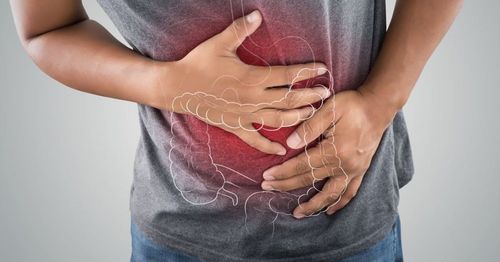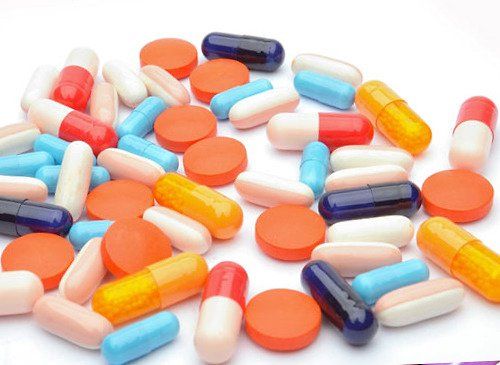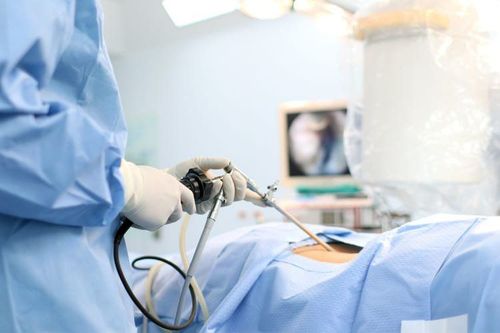This is an automatically translated article.
The article was professionally consulted by Specialist Doctor II Le Thanh Cam - Department of Pediatrics - Neonatology, Vinmec Da Nang International General Hospital.Crohn's disease is a nonspecific inflammatory disease that affects the small intestine, large intestine, and can even affect any part of the digestive tract from the mouth to the colon and the anus. The disease is familial, usually in children.
1. Crohn's Syndrome
Crohn's disease, also known as regional inflammatory bowel disease. Symptoms include redness, swelling (inflammation) and sores along the digestive tract, mainly causing ulcers in the inner wall of the small intestine and colon. It is part of a group of diseases known as inflammatory bowel disease or IBD. Crohn's disease affects the small intestine, large intestine, and can even affect any part of the digestive tract from the mouth to the colon and the anus. The cause of crohn's syndrome is currently unknown.Crohn's disease can occur at any age. It usually affects people aged 15 to 35 years. But Crohn's can also occur in young children. The disease affects both men and women equally.
Children or adolescents may be more at risk for Crohn's disease, if they:
Have a family history of Crohn's disease. Caucasians are most at risk, but the disease can affect any ethnic group. If you are of Jewish descent, the risk is even higher. Where you live: Crohn's disease is more common in people living in cities and industrialized countries, it's possible that environmental factors, including a diet high in fats in foods or refined, play a role. role in Crohn's disease. Use isotretinoin, non-steroidal anti-inflammatory drugs (NSAIDs).
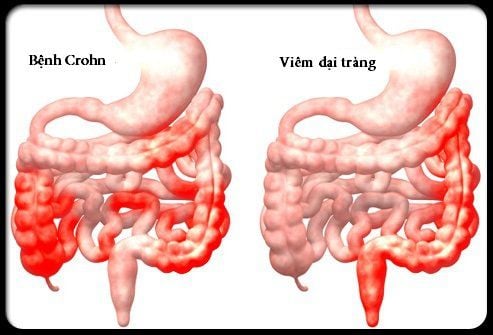
2. Is Crohn's disease dangerous?
If not treated in time, Crohn's disease can cause dangerous complications such as:Intestinal obstruction: Crohn's disease affects the entire thickness of the intestinal wall. Over time, the intestinal wall can thicken and narrow the lumen, which can block the flow of digestive juices through the affected portion of the intestine. In some cases, surgery is required to remove the diseased part of the intestine. Malnutrition: Diarrhea, abdominal pain and intestinal spasms can interfere with eating or interfere with the intestines to absorb nutrients causing malnutrition. Also, anemia is common in people with Crohn's disease. Gastrointestinal ulcers: Chronic inflammation can lead to ulcers anywhere on the digestive tract, including the mouth and anus and in the genital area. Ulcers can cause perforation or the formation of fistulas. Fistulas: Sometimes an ulcer can extend completely through the inner wall of the intestine creating a fistula (an abnormal connection between different parts of the intestinal tract, between the intestines and skin, or between the intestines and organs). other, such as bladder or vagina). When fistulas form, food can pass through the fistula areas. An external fistula can cause fluid to drain into the skin, and in some cases, the fistula can become infected and form an abscess, which can be life-threatening if left untreated. Anal fissure: This is a crack in the anus or in the skin around the anus, which can become infected with bacteria. Fissures often cause pain during bowel movements. Other health problems: In addition to inflammation and ulcers in the digestive tract, Crohn's disease can cause problems in other parts of the body, such as arthritis, inflammation of the eyes or skin, club-shaped nails, kidney stones, and kidney stones. , gallstones and sometimes inflammation of the bile ducts. People with long-term Crohn's disease can also develop osteoporosis.
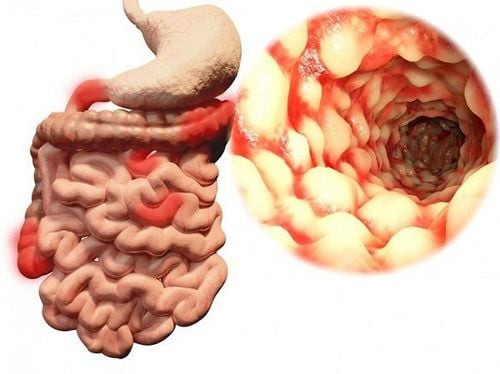
3. Diagnosis
Usually, the doctor will review the patient's medical and family history, check for signs of Crohn's syndrome if the child has had the disease for a long time:Abdominal pain Loose stools (diarrhea) Fever Weight loss healthy red blood cells (anemia). This can make your child feel tired. Laboratory tests indicated in the diagnosis of Crohn's syndrome:
Blood tests : When blood tests are done, your doctor looks for signs of anemia or signs of leukocytosis – a manifestation of an inflammatory response. in the body. Stool culture: This test is done to see if a parasitic or bacterial infection is causing the symptoms. Endoscopy: The doctor uses an endoscope to examine the inside of a part of the digestive tract. Tissue samples or biopsies from inside the digestive tract may also be taken for testing. Colonoscopy: This is a procedure that allows the doctor to look at the entire length of the large intestine. It can help check for abnormal growths, inflamed tissue, sores or ulcers, and bleeding. Biopsy: A tissue sample is taken from the lining of the colon and examined in a laboratory. CT scan: These imaging tests help the doctor see the small intestine and can show any signs of inflammation or complications. Contrast colonoscopy: This procedure uses a contrast medium to make the colon visible on an X-ray.
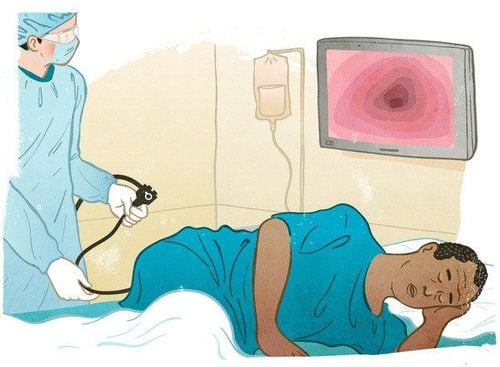
>> See also: Treatment for high-risk Crohn's patients - Article by Doctor Mai Vien Phuong - Department of Examination & Internal Medicine - Vinmec Central Park International General Hospital.
4. Treatment
Crohn's disease is a long-term (chronic) disease. There is no definitive cure for this disease. But there are a number of methods in place that can help control the disease. Treatment of the disorder has 4 goals:Issues with correct nutrition Control swelling and inflammation Control symptoms such as abdominal pain, diarrhea and rectal bleeding Prevent complications. These include fistulas (fissures) and intestinal stenosis causing obstruction. The choice of treatment for a child needs to be based on many factors such as: age, medical history, severity of the disease.
Medical treatment: Medicines are often used to reduce inflammation in the colon. This can help relieve abdominal pain and diarrhea. More severe cases may require the use of steroids, antibiotics, or drugs that affect the body's immune system. Diet: Making some changes to your child's diet can help ease symptoms. In some cases, symptoms are made worse by milk, hot spices, or fiber. See a specialist for advice on the right diet for your child. Provide vitamins: Vitamins can help prevent certain problems or help maintain remission. Because many children with Crohn's don't absorb nutrients normally, vitamin deficiencies are common. However, do not arbitrarily supplement vitamins for children, it is necessary to consult a doctor about vitamins and doses for children. Surgery: If diet and lifestyle changes, medications, or other treatments don't relieve your signs and symptoms, your doctor may consider surgery to remove part of your digestive tract. chemically damaged or to close the fistula or remove scar tissue. Surgery may provide the best remission in Crohn's treatment, but the benefits of surgery are only temporary. The disease often recurs elsewhere in the gastrointestinal tract. In a nutshell, Crohn's is a type of chronic inflammatory bowel disease (IBD) with symptoms like redness, swelling (inflammation), and sores along the digestive tract. Currently, there is no cure for Crohn's, but making some dietary changes can help ease symptoms. The treatment of the disease with drugs or surgery depends on the specific situation of each patient.
Pediatrics department at Vinmec International General Hospital system is the address for receiving and examining diseases that infants and young children are susceptible to: viral fever, bacterial fever, otitis media, pneumonia in children, .... With modern equipment, sterile space, minimizing the impact as well as the risk of disease spread. Along with that is the dedication from experienced doctors who specialize in pediatric patients, making the examination no longer a concern for parents.
Please dial HOTLINE for more information or register for an appointment HERE. Download MyVinmec app to make appointments faster and to manage your bookings easily.





